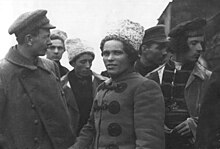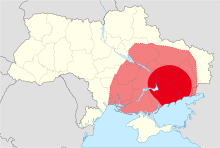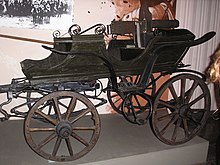Nestor Makhno
Raised by a peasant family and coming of age amid the fervor around the 1905 Revolution, Makhno participated in a local anarchist group and spent seven years imprisoned for his involvement.
The Bolsheviks immediately turned on Makhno, wounding him and driving him westward in August 1921 to Romanian concentration camps, Poland, and Europe, before he settled in Paris with his wife and daughter.
[44] As the years passed, Makhno began to write his own works and to distribute them among his fellow prisoners,[45] starting off with a poem titled "Summons" that called for a libertarian communist revolution.
[64] As a union leader, Makhno led workers in strike actions against their employers, demanding doubled wages and vowing continued work stoppages if refused.
[72] Following news of Lavr Kornilov's attempted coup against the Provisional Government, Makhno led the establishment of a "Committee for the Defense of the Revolution", which organized armed peasant detachments against the Huliaipole landlords, bourgeoisie, and kulaks.
[79] In February 1918, representatives from the Ukrainian People's Republic (UPR) signed a peace treaty with the Central Powers, inviting the forces of the German Empire and Austria-Hungary to invade and occupy Ukraine.
[100] Makhno staunchly defended the Ukrainian anarchist movement from charges of "counter-revolution", criticizing the Red Guards for sticking to the railways while peasant partisans fought on the front lines.
[106] During Makhno's absence from Ukraine, the Austro-German occupation forces orchestrated a coup in late April 1918 against their former allies within the Ukrainian People's Republic, removing the UPR's Central Council and installing Pavlo Skoropadskyi as Hetman of a new conservative client state.
[124] After defeating Austrian units in the nearby village of Marfopil, Makhno produced a letter that was translated into the German language, encouraging the conscripted occupation troops to mutiny, return home and launch revolutions of their own.
[137] At a regional insurgent conference, Makhno proposed that they open up a war on four simultaneous fronts against the Hetmanate, Central Powers, Don Cossacks, and nascent White movement.
[167] In an insurgent military congress in May, Makhno expanded on this anti-authoritarian position with a denunciation of the Bolsheviks, their implementation of bureaucratic collectivism, and their political repression, which he compared to the Tsarist autocracy.
[187] The insurgents launched several effective attacks behind White lines, Makhno himself commanding a cavalry assault against Mykolaivka that resulted in the capture of sorely needed munitions.
There Makhno negotiated a temporary truce with Petliura, the commander-in-chief of the Ukrainian People's Army (UPA), to allow wounded insurgents to recuperate on neutral ground before launching a counteroffensive.
[200] At a regional congress in Oleksandrivsk, Makhno presented the Draft Declaration of the Revolutionary Insurgent Army of Ukraine, which called for the establishment of "free soviets" outside of political party control.
[219] Despite these outcomes, Makhno reaffirmed his distrust for his "irreconcilable enemies" in the Bolshevik Party, stating that the necessity of a military alliance with them should not be confused with a recognition of their political authority.
[223] Back in his hometown, Makhno's request for three days of rest and recuperation was rejected by the Bolshevik command, which ordered the insurgents to continue their offensive, under penalty of nullifying their alliance.
[225] After the combined Bolshevik-Makhnovist forces defeated Pyotr Wrangel in Crimea and ended the Russian Civil War's Southern Front, the Bolsheviks once again turned on their anarchist allies.
[237] Taking his own 2,000-strong detachment north on horseback at a pace of 80 kilometers each day, he derailed a Bolshevik armored train at Oleksandrivsk, before pushing deep into the provinces of Kherson and Kyiv, all the while pursued by Red divisions.
[240] Following the outbreak of the Kronstadt rebellion, Makhno dispatched detachments to various regions of Southern and Central Russia to foment insurrection, while he himself stuck to the banks of the Dnieper River.
After crossing back over to left-bank Ukraine, he split his detachment again, sending one to stir up revolt against the Cheka near the Sea of Azov while Makhno's own contingent of 1,500 cavalry and two infantry regiments continued along its path, seizing the equipment of the Red units it routed.
[243] Towards the end of May 1921, Makhno attempted to organize a large-scale offensive to take the Ukrainian Bolshevik capital of Kharkiv, pulling together thousands of partisans before he was forced to call it off due to substantial Red defenses.
The subsequent pursuit of Makhno lasted five days and covered 520 kilometers, causing his sotnia heavy losses and almost running them out of ammunition, before they were finally able to shake the armored detachment off their trail.
[257] In prison, Makhno drafted his first memoir, which Peter Arshinov published in 1923 in his Berlin-based newspaper Anarkhicheskii vestnik (Russian: Анархический вестник; English: Anarchist Messenger).
[261] Unable to secure a visa to travel to Germany and facing a severe strain on his marriage with Halyna, Makhno attempted suicide in April 1924 and was hospitalized by his injuries.
[271] According to Alexander Berkman, Makhno particularly despised living in a big city and dreamed of returning to the Ukrainian countryside, where he could "tak[e] up again the struggle for liberty and social justice".
When the meeting was raided by police, Makhno was arrested and threatened with deportation, but he was defended by Louis Lecoin and Henri Sellier, who secured his continued stay in France.
[277] Schwarzbard immediately informed Makhno of his intention to assassinate Petliura in revenge for the anti-Jewish pogroms carried out in the Ukrainian People's Republic, during which some 15 of his family members had been killed.
[311] Following the Makhnovist capture of Huliaipole from the Central Powers in late 1918, Makhno met a local schoolteacher called Halyna Kuzmenko, who became his wife and a leading figure in the Makhnovshchina.
[316] Other biographers, such as Michael Malet and Victor Peters, wrote that Makhno began to drink heavily during the final years of his life, "when he knew that the tuberculosis was killing him anyway".
[329] Cultural allusions to Makhno in popular media have included a supporting role in Michael Moorcock's 1981 alternative history novel The Steel Tsar,[330] the opening track in the Russian rock band Lyube's 1989 album Alert [ru] during the fall of communism in the Eastern Bloc,[331] a song U.S. representative Dana Rohrabacher had written and played for the 1991 official visit of a People's Deputy of Ukraine, and the pseudonym used by the leader of an "anti-yuppie crusade" in San Francisco against perceived gentrification by Silicon Valley.







